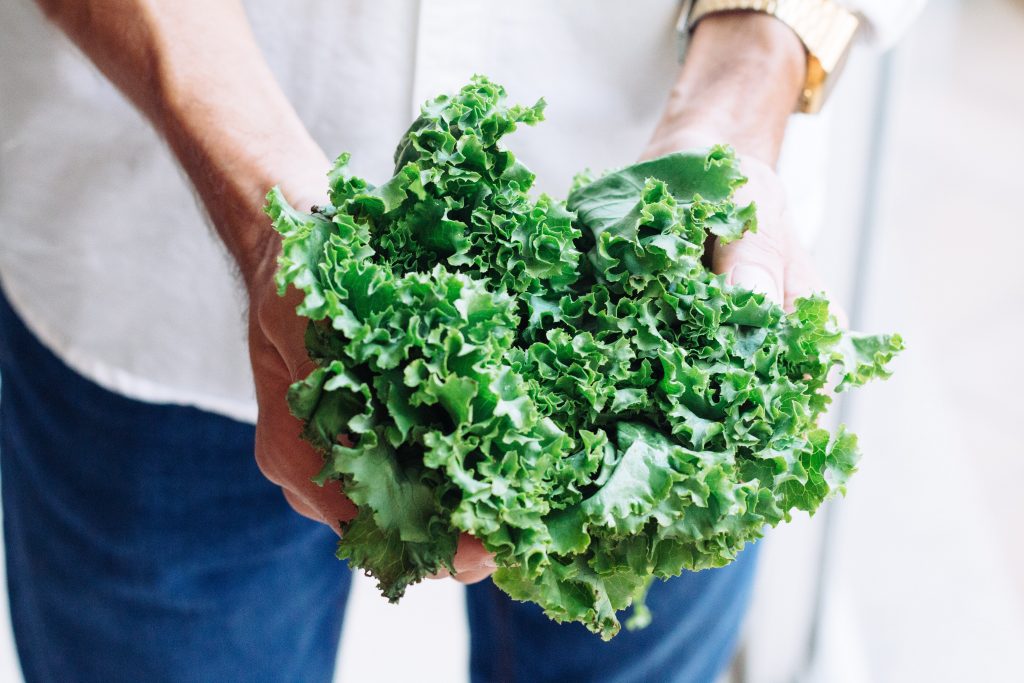Advertisement
Paradise Found
Andrea Hannemann (aka @EarthyAndy) resolved her intractable health issues by ditching processed foods and eating whole plant foods instead. Her 30-day challenge could be a game changer for you too.

When Andrea Hannemann started seeing stories about the healing powers of plant-based diets several years ago, she didn’t believe them. “I thought it was staged, you know—to see someone who looked at the top of their health with this huge plate of fruit in front of them,” she says. “I just thought, ‘How is that possible?’”
Today, after a dietary journey that transformed her health, Hannemann is one of the Internet’s biggest boosters of plant-based eating (to the tune of 1.2 million @EarthyAndy followers on Instagram)—and the radiantly healthy mother of three boys isn’t shy about posing with fruit to punctuate the point.
Indeed, the sumptuous photos of colorful produce and plant-based dishes on her IG feed make eating healthy look like a slice of paradise. It also doesn’t hurt that many are set against the swoon-worthy tropical backdrop of the beach town in Oahu, Hawaii, that she and her family call home.
With the recent publication of her first book, <Plant Over Processed>, Hannemann has compiled the rules of the 30-Day Plant Over Processed Challenge that helped her make the switch to a plant-based diet, along with 75 recipes that changed her life. One motivation for writing the book was to help smooth the path for others who’d like to give plant-based eating a whirl—because she knows how daunting it can seem. When she first began, “I felt like stepping into this vegan/plant-based diet seemed so limiting. Like, ‘What do you eat?’” she recalls. “But it’s actually been the most abundant lifestyle I’ve ever lived.”
Advertisement
Trusting her gut
Ever since she was a girl growing up in Saskatchewan, Canada, Hannemann has enjoyed experimenting in the kitchen. “I have a pretty funny picture of me with a garbage bag on my head that says ‘Chef’ as an eight-year-old,” she says.
But from a young age, Hannemann’s delicate health made enjoying food difficult. In her teens, she was diagnosed with celiac disease and irritable bowel syndrome (IBS). She also suffered from irregular menstrual cycles and hypothyroidism.
Her problems didn’t disappear when she moved to Hawaii to attend college, fulfilling a lifelong dream of living in the tropics. For years, she experimented with various diets and tried following the advice of different specialists, but nothing permanently resolved her issues.
As the years passed, her digestive distress became so bad that she wouldn’t eat unless she could be at home—near the toilet. At one point, she was also menstruating every other week and taking thyroid medication. “I was told by my doctor … ‘You’re going to have to take this forever,’” she says. As that viewpoint settled in, “I was just feeling very defeated,” Hannemann recalls.
And then, one January evening in 2016, it dawned on her that no doctor was going to cure her. Instead of giving up the fight, she could take her recovery into her own hands.
She decided that even though she was skeptical of the plant-based healing stories she kept seeing online, it couldn’t hurt to give the diet a try. “It was basically me hitting a rock bottom, feeling like I’m just going to try this one last thing,” she notes. “Something inside of me said, ‘Just trust in nature.’”
Advertisement
Diving in
Hannemann laid out some rules for herself as she transitioned to plant-based eating—and these same rules now form the basis of her 30-Day Plant Over Processed Challenge. She vowed to give herself 30 days on the diet before making a decision about whether she liked it or not. And despite her self-described “sweet tooth,” she pledged to eat whole plant foods first and keep processed foods to a minimum. “You could really eat a box of Oreos every single day and be vegan,” Hannemann notes—but she knew that likely wouldn’t bring the health benefits she sought.
She opted to eat foods throughout the day in order of how long they take to digest, a rule based on the Ayurvedic concept of food combining. She ate her first two meals of the day raw (reserving cooked meals for dinner), which ensured she’d meet her goal of getting about 80 percent of her calories from “living” plant-based foods. To stay full and satisfied, she prioritized “high-volume foods” such as fruits, vegetables, and leafy greens—which contain a lot of water, fiber, and nutrients—over “low-volume foods” like nuts and seeds, which contain more fats.
Advertisement
The road to recovery
“I’m really glad I gave myself the rule that I couldn’t decide if I liked this [diet] or not until the 30 days were done because … it was a roller coaster,” says Hannemann. “My skin broke out. I had headaches. I was moody. I felt more bloated than I’d ever felt for the first two weeks.” She attributes those symptoms to the detoxification her body was experiencing.
However, by the end of the month, those discomforts not only subsided, but positive changes to her overall health began surfacing. “I felt at the end of my 30 days … I don’t want to say ‘reborn,’ but I felt this new energy; I felt this vibrancy,” she says. “I went from feeling like a couch potato that was waiting for the day to end … to someone who just wanted to make the most out of each day.”
As she continued the diet, her IBS became a thing of the past. “I don’t remember the last time I’ve had a flare-up,” Hannemann says. “It doesn’t control me anymore.” That may be because vegan diets can positively impact the composition of bacteria in the gut, which may improve gut health and ease IBS in some cases.
And as of 2019, her thyroid issues have resolved to the point where she no longer needs thyroid medication. Her experience squares with research that’s found that vegan diets tend to be associated with lower hypothyroid disease risk.
“For the first time in my life … I’ve felt a sense of normal,” she says.
Advertisement
Riding the wave
When she started @EarthyAndy, Hannemann had no idea how large the community would become. She first opened the Instagram account to keep herself motivated and accountable to the diet and connect with others on the same journey. Its exponential growth has been life changing.
Her husband Shem used to work long hours managing his family’s chain of burger restaurants. “Time … was something I didn’t have with my husband and he didn’t have with our family,” she says. Today, he and Hannemann work together on @EarthyAndy to spread her healthy message, allowing the family (who are now all on board with plant-based eating) to enjoy more togetherness.
Looking ahead, Hannemann isn’t sure what’s in store for her in 2021. “When I made goals for 2020, I was thinking I had control,” she says, noting that COVID-19 threw a wrench in that idea.
But no matter how @EarthyAndy evolves this year, Hannemann plans to keep her focus on sharing her enthusiasm for plant-based foods. “Because for me, your health starts with what you nourish your body with, and that makes everything else in life fun,” she says.
Advertisement
Breaking a sweat
How does Earthy Andy stay in shape?
“I’m a person that likes to move every day,” Hannemann says, whether that means surfing and hiking with her family or doing Pilates or HIIT workouts. For post-workout recovery, “I’m all about the [plant-based] protein smoothies,” she says.
Advertisement
The ND is in
Working with a naturopath may be the best decision you make in 2021. Hannemann’s naturopathic doctor, Diana Joy Ostroff, supported her as she addressed her health issues through diet. “Every other doctor said, ‘Here’s this medication; you should take this,” Hannemann says. Consulting a naturopath during dietary change can help ensure that you’re getting enough of all the essential nutrients.
How does Earthy Andy stay in shape?
“I’m a person that likes to move every day,” Hannemann says, whether that means surfing and hiking with her family or doing Pilates or HIIT workouts. For post-workout recovery, “I’m all about the [plant-based] protein smoothies,” she says.
Advertisement
Working with a naturopath may be the best decision you make in 2021. Hannemann’s naturopathic doctor, Diana Joy Ostroff, supported her as she addressed her health issues through diet. “Every other doctor said, ‘Here’s this medication; you should take this,” Hannemann says. Consulting a naturopath during dietary change can help ensure that you’re getting enough of all the essential nutrients.





